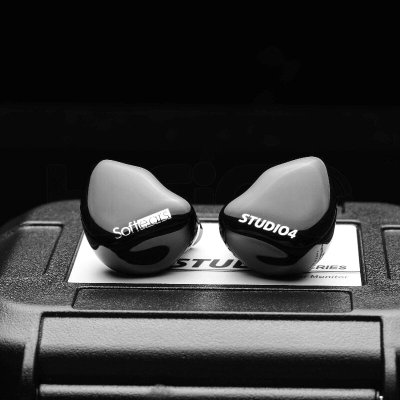Moondrop Variations and Softears Studio 4 use 1DD+2BA+2EST and 4BA driver setups respectively. Moondrop Variations costs $550 while Softears Studio 4 costs $450. Moondrop Variations is $100 more expensive. Both score 8 from reviewers. Moondrop Variations carries a user score of 7.5. Softears Studio 4 has significantly better mids with a 1-point edge and Moondrop Variations has significantly better treble with a 1-point edge.
Insights
| Metric | Moondrop Variations | Softears Studio 4 |
|---|---|---|
| Mids | 7 | 8 |
| Treble | 8 | 7 |
| Soundstage | 8 | 8 |
| Dynamics | 5 | 5 |
| Tonality | 7 | 7 |
| Technicalities | 8 | 7 |
Jaytiss Reviews Comparison
Moondrop Variations reviewed by
Youtube Video Summary
Build & accessories: Variations shows its age. The resin shell fits well and the metal faceplate looks clean, but the body feels a bit chintzy and slightly see-through, with a chunky nozzle compared to newer slim designs. The pocketable case is nice, yet the stock cable is thin with barely visible L/R markers; modular termination is handy, but modern Q-Lock-style systems do it better.
Sound: tuning centers on energetic, engaging vocals with a tasteful sub-bass lift—not a bass-head set, more a polite, gradual boost. A dip around the lower mids can read as thinness, pushing some female vocals a touch distant, while the top end has air, detail, and an overall chill presentation. Technicalities are solid rather than class-leading at the price, but the EST implementation is clean and cohesive. Expect limited mid-bass weight, occasional shout for the sensitive, and ergonomics that won’t suit everyone.
Context & verdict: despite a wave of competitors (Oracle MK2, Hype 4, Softears Studio 4/Volume S, AFUL Performer 7, DUNU Brain Dance, even Moondrop’s own Dusk at a lower price), this tuning remains a benchmark reference around the mid-fi bracket. Variations delivers the archetype many listeners still chase: clean sub-bass, airy treble, and a deft, easygoing balance that makes it a “legendary” set in the catalog. Not flawless, but noteworthy—the kind of IEM worth borrowing at a meet and auditioning for 10–15 minutes to see if that lighter midrange flavor clicks.
Jaytiss Youtube Channel
Buy Moondrop Variations on HiFiGO
Ad
Price: $479
Buy Moondrop Variations on HiFiGO
Softears Studio 4 reviewed by
Youtube Video Summary
Starry Edition brings a fresh faceplate to the Softears Studio 4 without changing the tuning. The translucent, slightly large shell seals firmly and delivers strong isolation; the only nit is a modest nozzle lip that still holds tips fine. Packaging leans “studio”: compact Pelican-style case, extension cable, tips, 6.3 mm adapter, and a soft black cable that feels nice but lacks a chin slider and terminates in 3.5 mm.
Sonically, this 4BA set is about clarity, air, and top-end extension—described as among the best heard under $800. Vocals come through vivid, mids are clean, and bass has a mild shelf: tasteful impact without bloat, though it’s not a slam machine. Expect excellent imaging, space, and detail; a touch of EQ can add weight if desired. It can be a bit source-picky: low output impedance sources suit it best, while a 10 Ω adapter pushes more treble and trims bass in a less pleasing way.
Against peers, Studio 4 is praised over Softears Twilight for air/extension (while acknowledging Twilight’s smooth DD charm) and over Volume for overall technicalities despite the small price gap. Versus RSV, Studio 4 avoids the RSV’s slight bass “muffle” and undercuts it on price; compared with Monarch MKII, it delivers a similar tonal aim without the occasional grain. Sets like Kiwi Ears 4, Truthear Hexa, and Binary Acoustics D Quattro trade blows on bass quantity versus air, but Studio 4’s upper-air detail and coherence make it a standout. At an often-seen street of ~$368, it’s framed as a benchmark sub-$500 pick and earns a full recommendation for listeners chasing articulate treble, lifelike vocals, and refined balance.
Jaytiss Youtube Channel
Buy Softears Studio 4 on HiFiGO
Ad
Price: $449
Buy Softears Studio 4 on HiFiGO
Moondrop Variations Details
Driver Configuration: 1DD+2BA+2EST
Tuning Type: U-Shaped
Brand: Moondrop Top Moondrop IEMs
Price (Msrp): $550
Support our free service! Buying through our affiliate links costs you nothing extra:
Softears Studio 4 Details
Driver Configuration: 4BA
Tuning Type: Neutral
Brand: Softears Top Softears IEMs
Price (Msrp): $450
Support our free service! Buying through our affiliate links costs you nothing extra:
Moondrop Variations Scorings
Average Technical & Tuning Grades
Average Tunign Grade
A-- It balances warmth and clarity well, showing only minor quirks along the way. Timbre feels believable with most instruments.
Average Technical Grade
A+- It sounds refined and controlled, keeping instruments neatly separated with immersive staging. Busy arrangements remain neatly organized.
Softears Studio 4 Scorings
Average Technical & Tuning Grades
Average Tunign Grade
A-- It balances warmth and clarity well, showing only minor quirks along the way. Timbre feels believable with most instruments.
Average Technical Grade
A-- The presentation feels orderly, balancing workable detail retrieval with acceptable imaging cues. It keeps momentum without smearing transients.
Moondrop Variations User Reviews
Share your experience and build your personal ranking list.
You need to be signed in to write your own reviewThis was one of my first IEMs. I loved it and hated it. It is still the cleanest sounding IEM I own - also compared to something much more expensive.
Pros
Very clean sound signature combined with a satisfying amount of sub-bass. Sounds great with the right songsCons
Thin mids and poor note weight in some songsTaught me Harman is not for me...
Pros
Clean and clearCons
Recessed lower mids, a bit too calm and lifelessSoftears Studio 4 User Reviews
"This is an example review"
Pros
- Example pro 1
- Example pro 2
Cons
- Example con 1
- Example con 2
Share your experience and build your personal ranking list.
You need to be signed in to write your own reviewFind your next IEM:
IEM Finder Quiz
newIEM Comparison Tool
newVS



